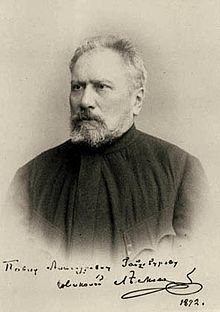Figura (Nikolai Leskov)
Figura ( Russian Фигура ) is a short story by the Russian writer Nikolai Leskow , which was published in 1889 in Volume 3, No. 13 of the Trud magazine , edited by Hermann Hoppe, in Saint Petersburg .
Emergence
The noble officer Figura disregards the code of honor applicable among Russian officers in the middle of the 19th century and instead prefers to act according to the principle of Christian humility in the event of a conflict . With the best will in the world, General Osten-Sacken and his officer corps can no longer tolerate the dissent in their ranks.
The general was a relative of Tolstoy . Leskov, who did not know Osten-Sacken personally, asked his friend Tolstoy - regarding the general, who was even too pale - for help. Tolstoy was happy to help. In fact, Leskov's text was actually about Tolstoy's view of charity . At the same time, Tolstoy criticized the title hero, who, in his opinion, was too "cold". Leskov had designed the general passage in a funny way, whereas Tolstoy wanted a thoroughly serious version.
content
The narrator gets to know Wigura, who is called Figura by everyone, as a 60-year-old stocky Kiev suburban farmer in Kurinewka. Figura lives in a mud hut with his young wife, the Ukrainian Christja. The not yet graying old man cultivates the land around the hut with this woman - only for his own livelihood. Christja has an illegitimate child; the beautiful Katrja. Figura is not the father. He picked them up under the poplars of Podolinski Park and took them to himself.
Figura tells the story of his dismissal from the military. From Holy Saturday to Easter Sunday he has to guard the powder depots of his regiment in the south of Russia. In one of the cellars, on Easter vigil , the officer Figura receives a cuff from a drunk foreign Cossack under the eyes of his subordinate soldiers . The attacker then tears off his epaulette . The soldiers overwhelm and bind the perpetrator. Figura forgives because he doesn't want the Cossack beaten to death.
On the third day of Easter, Figura has to go to the regiment commander. The colonel locks himself in with his officer and ultimately suggests that he abdicate. A little later, General Osten-Sacken, the colonel's superior, behaved no differently. Because Osten-Sacken learned from the Colonel that Figura was a good officer, he seriously worries about his future. Since Figura is neither wealthy nor has influential relatives, he should become a monk. The strictest order, according to the general, would take the ascetic. When Figura gratefully declines, Osten-Sacken grants him an annual pension of at least 36 rubles.
The army is still paying the amount to the grateful and humble noble suburban farmer in Kurinewka at the time of the story.
German-language editions
- Pawlin . Figura. Edited and transmitted by Lydia S. Meli-Bagdasarowa . 232 pages. Verlag der Arche, Zurich 1945 (series: Die kleine Bücher der Arche)
Output used:
- Figura. German by Charlotte Kossuth . P. 351–378 in Eberhard Reissner (Ed.): Nikolai Leskow: Collected works in individual volumes. The juggler pamphalon. 616 pages. Rütten & Loening, Berlin 1971 (1st edition)
Web links
- The text
- Entry in the Laboratory of Fantastics (Russian)
- Entries in WorldCat
annotation
- ↑ For the Russians that is the Tuesday after Easter.
